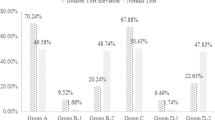Abstract
Purpose
The influence of short-term severe thyroid hormone deficiency on sleep is currently still unknown. Several studies have demonstrated an effect of long-term hypothyroidism on sleep disorders due to anatomical changes of the pharynx or body mass. The aim of this preliminary study, however, is to evaluate the changes in sleep patterns of patients with short-term hypothyroidism to elucidate the isolated effect of thyroid hormone withdrawal before anatomical changes can potentially occur.
Methods
Ten patients with differentiated thyroid carcinoma were enrolled in this study. Two patients discontinued the study and one patient was finally excluded due to obesity, so that the datasets of seven patients were available for study analysis. During the course of carcinoma treatment, each patient had previously undergone total thyroidectomy and I-131 remnant ablation. Polysomnographic measurements were performed twice: (1) over the course of two consecutive nights during severe thyroid hormone deficiency after levothyroxine withdrawal and prior to further diagnostics and therapy and (2) during euthyroidism after substitution with levothyroxine.
Results
Comparison of the Epworth Sleepiness Scale during hypo- and euthyroidism for each patient revealed no statistically significant difference. Furthermore, the comparison of polysomnographic parameters like (1) apnea-hypopnea index, (2) the duration of various sleep stages, (3) duration of rapid eye movement sleep, (4) latency until rapid eye movement sleep, (5) total sleep time, (6) periodic leg movements, and (7) arousal index showed no statistically significant differences between the hypothyroid or euthyroid state.
Conclusions
We conclude that, in this preliminary experimental setting, short-term severe thyroid hormone deficiency per se does not cause sleep disturbances and a feeling of fatigue as described in other studies may be due to changes in perception or brain metabolism during hypothyroidism.



Similar content being viewed by others
References
Bottini P, Tantucci C (2003) Sleep apnea syndrome in endocrine diseases. Respiration 70:320–327
Hira HS, Sibal L (1999) Sleep apnea syndrome among patients with hypothyroidism. J Assoc Physicians India 47:615–618
Resta O, Pannacciulli N, Di Gioia G, Stefano A, Barbaro MP, De Pergola G (2004) High prevalence of previously unknown subclinical hypothyroidism in obese patients referred to a sleep clinic for sleep disordered breathing. Nutr Metab Cardiovasc Dis 14:248–253
Resta O, Carratu P, Carpagnano GE, Maniscalco M, Di Gioia G, Lacedonia D, Giorgino R, De Pergola G (2005) Influence of subclinical hypothyroidism and T4 treatment on the prevalence and severity of obstructive sleep apnoea syndrome (OSAS). J Endocrinol Invest 28:893–898
Hasan A, Uzma N, Swamy TL, Shoba A, Kumar BS (2011) Correlation of clinical profiles with obstructive sleep apnea and metabolic syndrome. Sleep Breathing. doi:10.1007/s11325-010-0463-z
Alotair H, Bahammam A (2008) Gender differences in Saudi patients with obstructive sleep apnea. Sleep Breathing 12:323–329
Dursunoglu N, Ozkurt S, Sarikaya S (2009) Is the clinical presentation different between men and women admitting to the sleep laboratory? Sleep Breathing 13:295–298
Miller CM, Husain AM (2003) Should women with obstructive sleep apnea syndrome be screened for hypothyroidism? Sleep Breathing 7:185–188
Misiolek M, Marek B, Namyslowski G, Scierski W, Zwirska-Korczala K, Kazmierczak-Zagorska Z, Kajdaniuk D, Misiolek H (2007) Sleep apnea syndrome and snoring in patients with hypothyroidism with relation to overweight. J Physiol Pharmacol 58(Suppl 1):77–85
Luster M, Felbinger R, Dietlein M, Reiners C (2005) Thyroid hormone withdrawal in patients with differentiated thyroid carcinoma: a one hundred thirty-patient pilot survey on consequences of hypothyroidism and a pharmacoeconomic comparison to recombinant thyrotropin administration. Thyroid 15:1147–1155
Schroeder PR, Haugen BR, Pacini F, Reiners C, Schlumberger M, Sherman SI, Cooper DS, Schuff KG, Braverman LE, Skarulis MC, Davies TF, Mazzaferri EL, Daniels GH, Ross DS, Luster M, Samuels MH, Weintraub BD, Ridgway EC, Ladenson PW (2006) A comparison of short-term changes in health-related quality of life in thyroid carcinoma patients undergoing diagnostic evaluation with recombinant human thyrotropin compared with thyroid hormone withdrawal. J Clin Endocrinol Metab 91:878–884
Iber C, Ancoli-Israel S, Chesson A, Quan S (2007) The AASM manual for the scoring of sleep and associated events: rules, terminology and technical specifications, 1st edn. American Academy of Sleep Medicine, Westchester
Jha A, Sharma SK, Tandon N, Lakshmy R, Kadhiravan T, Handa KK, Gupta R, Pandey RM, Chaturvedi PK (2006) Thyroxine replacement therapy reverses sleep-disordered breathing in patients with primary hypothyroidism. Sleep Med 7:55–61
Ruiz-Primo E, Jurado JL, Solis H, Maisterrena JA, Fernandez-Guardiola A, Valverde C (1982) Polysomnographic effects of thyroid hormones primary myxedema. Electroencephalogr Clin Neurophysiol 53:559–564
Horner RL (2001) The neuropharmacology of upper airway motor control in the awake and asleep states: implications for obstructive sleep apnoea. Respir Res 2:286–294
Johns MW (1991) A new method for measuring daytime sleepiness: the Epworth Sleepiness Scale. Sleep 14:540–545
Dow KH, Ferrell BR, Anello C (1997) Quality-of-life changes in patients with thyroid cancer after withdrawal of thyroid hormone therapy. Thyroid 7:613–619
Constant EL, De Volder AG, Ivanoiu A, Bol A, Labar D, Seghers A, Cosnard G, Melin J, Daumerie C (2001) Cerebral blood flow and glucose metabolism in hypothyroidism: a positron emission tomography study. J Clin Endocrinol Metab 86:3864–3870
Acknowledgments
This study was supported by an unrestricted educational grant from Genzyme GmbH, Neu-Isenburg, Germany.
Declaration of interest
The authors report no declarations of interest.
Author information
Authors and Affiliations
Corresponding author
Rights and permissions
About this article
Cite this article
Koehler, C., Ginzkey, C., Kleinsasser, N.H. et al. Short-term severe thyroid hormone deficiency does not influence sleep parameters. Sleep Breath 17, 253–258 (2013). https://doi.org/10.1007/s11325-012-0682-6
Received:
Revised:
Accepted:
Published:
Issue Date:
DOI: https://doi.org/10.1007/s11325-012-0682-6




